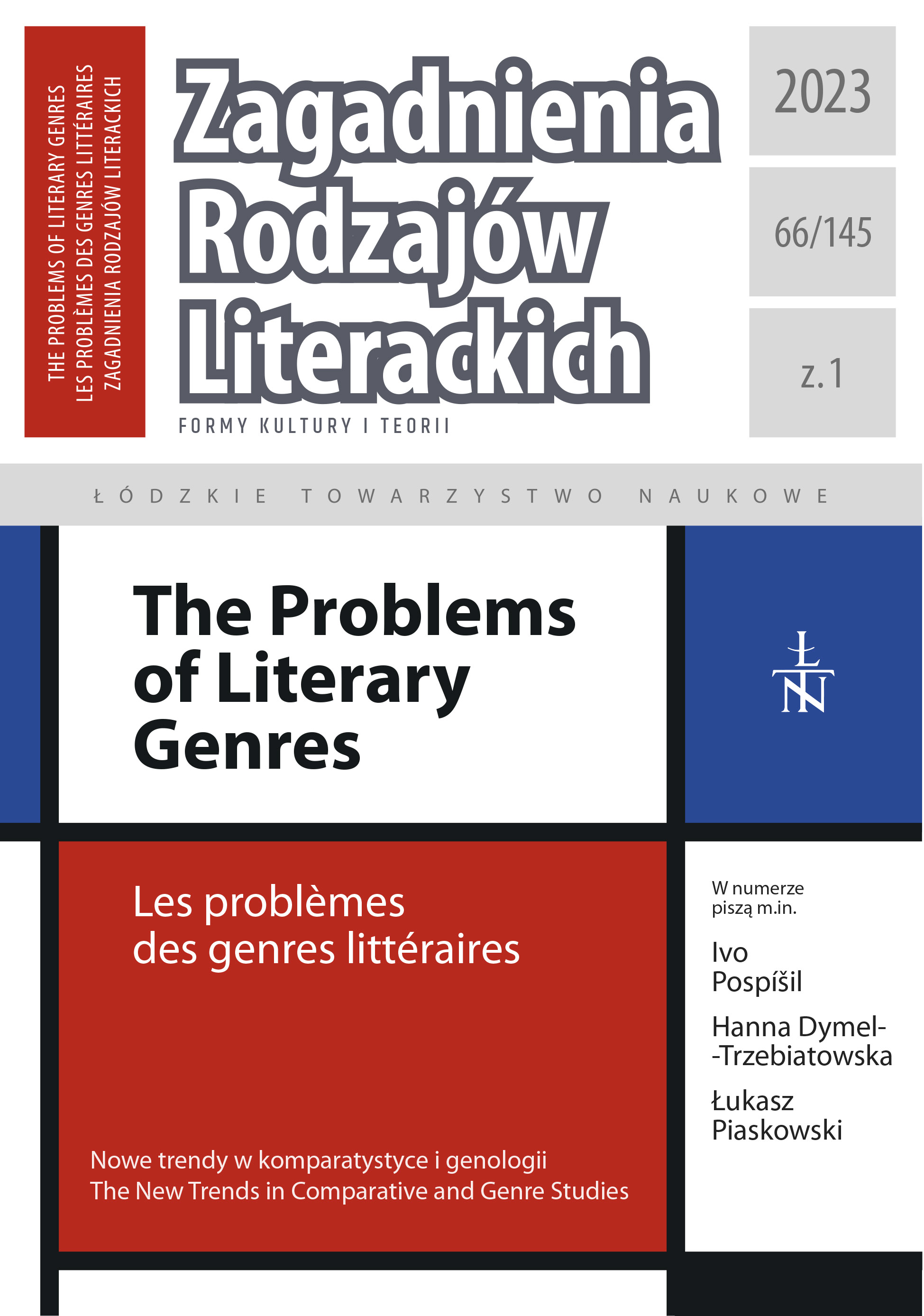On Some Pitfalls and Paradoxes of Comparative Literary Analysis (the Case Study of Anton Chekhov)
DOI:
https://doi.org/10.26485/ZRL/2023/66.1/11Słowa kluczowe:
comparative literature; Chekhov; ethics; aestheticsAbstrakt
The article is preoccupied by the problem of comparative analysis in the case of a writer as elusive as Chekhov, who does not formulate an open ideological message and generally withdraws his authorial voice. It raises the questions of what constitutes true kinship and similarity and highlights the vital importance of discerning above all the aesthetic aspect of the work, its poetics and artistic truth which take precedence over any structural or ideological considerations. To this end, various misconceptions and cases of false kinship are discussed, followed by examples of true continuity. In these examples, a close affinity is demonstrated through proximity of both ethics and aesthetics of the writers in question, and close textual comparisons are conducted. The next category discussed in the article addresses a paradox of simultaneously occurring rejection (or dislike) at one level, and real artistic closeness at another. We conclude by some general remarks on the nature of comparative analysis and offer another demonstration of stylistic proximity between two great writers, whose stylistics turns out to be so close that it is hard to tell them apart. We suggest that such parallels are not accidental, as form is inseparable from content, just as ethics is inseparable from aesthetics, and it is ultimately the artistic truth of the works under comparison that should always be kept strongly in focus.
Liczba pobrań
Bibliografia
Baranova-Shestova Natalia (1983), Zhizn Lva Shestova, vol. 1, La Presse Libre, Paris.
Bayley John (1970), Idealism and Its Critic (14:12), “The New York Review of Books”, 18 June.
Berdiaev Nikolai (1996), Tragediia i obydennost [in:] L. Shestov, Sochineniia v dvukh tomakh, vol. 1, Vodolei, Tomsk, p. 465–491.
Bonnefoy Yves (1979), On the translation of form in poetry, “World Literature Today” vol. 53(3), “An Homage to French Poet Yves Bonnefoy” (Summer), p. 374–379.
Brodskii Iosif (1995), O Serezhe Dovlatove [in:] S. Dovlatov, Sobranie sochinenii v 3 tomakh, vol. 3, Limbus Press, St. Petersburg.
Brodsky Joseph (1988), ‘Foreword’ to An Age Ago, A Selection of Nineteeth-Century Russian Poetry, selected and translated by A. Myers, Farrar-Straus-Giroux, New York.
Brodsky Joseph (1997), ‘Uncommon visage’ (the Nobel Lecture) [in:] On Grief and Reason. Essays, Penguin Books, Harmondsworth.
Chekhov Anton P. (1974–1983), Polnoe Sobranie Sochinenii i Pisem v 30 tomakh, vol. 1, Nauka, Moscow.
Chekhov Anton P. (1899 [first published]), The Lady with the Dog www.lecturia.org/en/short-stories/anton-chekhov-the-lady-with-the-dog/7803 [access: 30.05.2023].
Dalton-Brown Sally (2006), Listening for the lost children: Chekhov and Katherine Mansfield, “Essays in Poetics” no. 31, p. 67–84.
Davtian L.A. (1996), Motivy chekhovskoi dramaturgii v stikhotvorenii A.A. Akhmatovoi “Za ozerom luna ostanovilas” [Motives of Chekhovian plays in A.A. Akhmatova’s poem “Za ozerom luna ostanovilas”] [in:] Chekhoviana. Chekhov i ‘serebrianyi vek’ [Chekhoviana. Chekhov and the ‘Silver Age’], ed. M. Gorjacheva et al., Nauka, Moscow, p. 133–137.
Donne John (1624), Devotions upon emergent occasions and several steps in my sickness — Meditation XVII.
Dovlatov Sergei (2004), Sobranie sochinenii v 4 tomakh, vol. 4, Azbuka, St Petersburg.
Gasheva Nadieżda Nikołajewna (2006), Etiko-esteticheskij sintez v tvorchestve A. Chekhova i A. Akhmatovoi [‘Ethical-Aesthetic synthesis in the works of A. Chekhov and A. Akhmatova’], Izvestija Ural’skogo gos. universiteta [News of the Ural State university], “Humanities” vol. 11(41), p. 46–54.
Grossman Vasilii (completed in 1959), Zhizn i sudba [Life and Fate], www.lib.ru/PROZA/GROSSMAN/lifefate.txt [access: 30.05.2023].
Grossman Vasilii (1995), Life and Fate, trans. R. Chandler, The Harvill Press, London.
Iskander Fazil (1999), Poet [in:] Siuzhet sushestvovaniia, Podkova, Moscow.
Simon Karlinsky, ed. (1997), Anton Chekhov. Life and Thought; Selected Letters and Commentary, Northwestern University Press, Evanston.
Lapushin Radislav (2023), Soviet Contexts [in:] Chekhov in Context, ed. Y. Corrigan, Cambridge University Press, Cambridge, p. 223–229.
Leskov Nikolai (1981), Levsha (Skaz o tulskom kosom Levshe i o stalnoi blokhe) [in:] N. Leskov, Sobranie
sochinenii v 5 tomakh, vol. 3, Pravda, Moscow, www.az.lib.ru/l/leskow_n_s/text_0246.shtml [access: 30.05.2023].
Losev Lev (2002), Neliubov Akhmatovoi k Chekhovu [‘Akhmatova’s dislike for Chekhov’], “Zvezda” no. 7, p. 210–215.
Mirsky D.S. [Dmitry Petrovich Svyatopolk-Mirsky] (1927), Chekhov and the English, “The Monthly Criterion” no. 6 p. 292–304.
Moore Harry T., ed. (1962a), The Collected Letters of D.H. Lawrence, vol. 1, Heinemann, London.
Moore Harry T., ed. (1962b), The Collected Letters of D.H. Lawrence, vol. 2, Heinemann, London.
Naiman Anatolii (1989), Zapiski o Anne Akhmatovoi, Khudozhestvennaia literatura, Moscow.
Nemirovich-Danchenko Vladimir I. (1952), Statii. Rechi. Besedy. Pisma, Iskusstvo, Moscow.
Paperny Vladimir (2005), Lev Shestov: religioznaia filosofiia kak literaturnaia kritika i kak literatura, “Toronto Slavic Quarterly” no. 12, Spring.
Platonov Andrei (1988), Chevengur [in:] A. Platonov, Izbrannoe, Moskovskii rabochii, Moscow.
Rayfield Donald Patrick (1971), On the Meaning of Life [Introduction to Ivanov-Razumnik], Bradda Books, Letchworth, England.
Rayfield Donald Patrick (1999), Understanding Chekhov: A Critical Study of Chekhov’s Prose and Drama, Bristol Classical Press, London.
Rzhevskii Leonid (1976), Zagadochnaia korrespondentka Korneia Chukovskogo, “Novyi zhurnal” no. 123, June.
Shestov Lev (2001), Lektsii po istorii grecheskoi filosofii, Russkii Put’ — YMCA-Pres, Moscow–Paris.
Stepanov Andrei (2004), Brodsky on Chekhov: disgust, competition, affinity [Brodsky o Chekhove: otvrashchenie, sorevnovanie, skhodstvo], “Zvezda” no. 1.
Tabachnikova Olga (2006), “The World is Ugly and People are Sad”: On Chekhov’s Ethics and Aesthetics in the Works of Sergei Dovlatov, “Essays in Poetics” vol. 31, Autumn, p. 319–354.
Tabachnikova Olga (2009), Akhmatova on Chekhov: A Case of Animosity?, “Russian Literature” vol. 66(2), 15 August, Special Issue “A.P. Čechov”, Elsevier, Amsterdam, p. 235–255.
Tabachnikova Olga (2015), Russian irrationalism from Pushkin to Brodsky, Bloomsbury Academic, London–New York–New Delhi.
Verheil Keis (1992), Tishina u Akhmatovoi [Silence in Akhmatova’s poetry] [in:] Tsarstvennoe slovo [Royal Word], eds. N.V. Koroleva, S.A. Kovalenko, “Akhmatovskiie chteniia” [“Akhmatova’s studies”] vol. 1, Nasledie, Moscow.
Wood James (1999), The Broken Estate: Essays on Literature and Belief, Jonathan Cape, London.
Woods Joanna (2001), Katerina: The Russian World of Katherine Mansfield, Penguin, Auckland.
Pobrania
Opublikowane
Jak cytować
Numer
Dział
Licencja
Prawa autorskie (c) 2023 Łódzkie Towarzystwo Naukowe i autorzy

Utwór dostępny jest na licencji Creative Commons Uznanie autorstwa 4.0 Międzynarodowe.







